Design Journal: Villains
I'm gonna talk about how we're designing a major new feature we're calling Villains. I'll start with some history and background to cover the motivation, and then I'll get into our proposed solution (that we've started building), along with some of the risks and pitfalls that we hope to avoid in the process.
NOTE: very mild (trailer-level) spoilers below.
Background
Something we've had a lot of trouble with, ever since the beginning, was an overarching story.
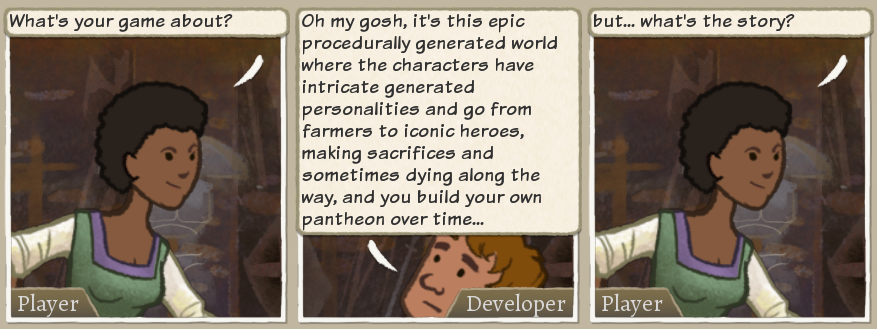
At first we had this vague sense that you were sortof "settling" the land, making it safe from monsters, that sort of thing. And once we went down the procedural heroes and fights path, we didn't want to marry ourselves to a particular overall storyline either. Here's why.
Right now, if you play the game 5 times, you'll get a different cast of heroes each time, and you'll (hopefully!) see new and different events each time. That's cool! But if we had a set plot with scripted events, then those would quickly become boring. That's why our "overarching" plot is as thin as possible. There are monsters. Stop them. It's enough to point you in a direction, and that's all it does. It's intended to melt into the background after that.
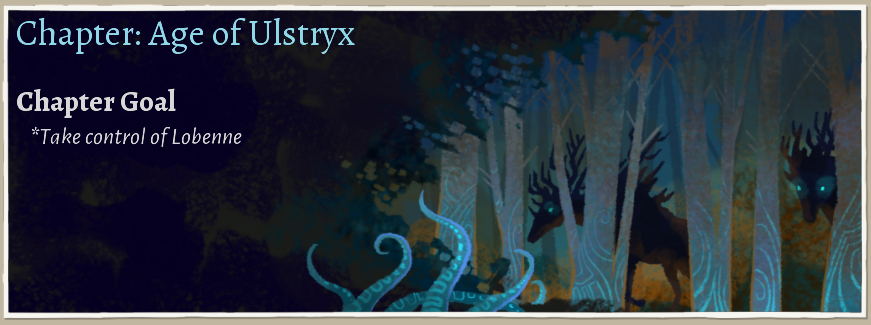
But ok, it's not super satisfying. One of the big goals for our game is to be a kind of storytelling tool, so that players can play out their own unique epic stories. But, so far we've simply ignored or handwaved the whole main motivation for being heroes in the first place. Why are you here? What do you want? We just rely on genre tropes and it's not satisfying.
A long time ago we had an idea for a cast of Villains, that maybe you'd pick one, or randomly get one in each game, and they would provide the story for that playthrough. We tried going down that road and we had to stop, because the story we were creating was brittle, it couldn't handle a hero dying partway through a plot arc, etc.. It took a long time to write and it wouldn't take very long to play, and once you had played it, you wouldn't want to play it again.
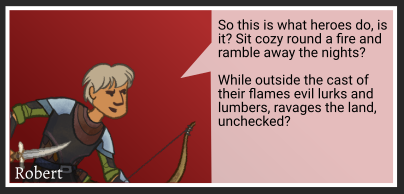
So we abandoned that route and starting writing events that could be triggered randomly, when the heroes arrive at a hostile site, for example. (This is pretty much the approach that FTL uses, along with having a very thing overarching plot.) That's where we've been focusing our efforts over the last couple years, and it's paid off. So now we have a game that we can play over and over again, which is pretty great.
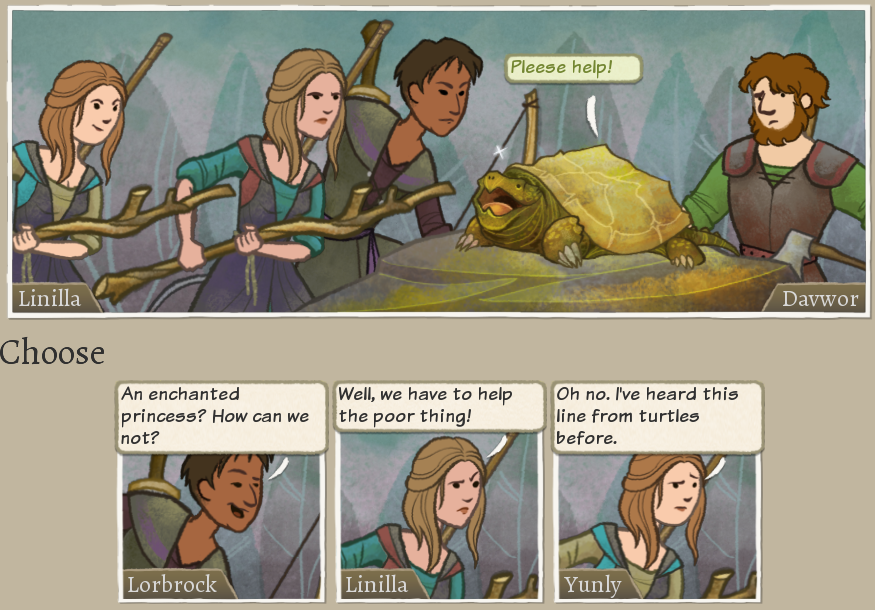
But, the downside is that our overall campaign doesn't really feel unique or important. Fight some monsters, fight some different monsters. Ok. What can we do about that? This is one of our most requested improvements, so we've got to tackle it.
Alternatives
Here's some of the stuff we thought about.
Procedural Chapters
Our first thought was to see if we could come up with more interesting chapters procedurally. We'd define a bunch of different chapter goals, and each campaign you'd get a handful of them, and that would make it feel different, right? Well, maybe. But probably what would happen instead is the second time you got the "rescue the npc" chapter you would recognize it and stop paying attention to it. And also, a mish mash of different things happening, and then a big final battle isn't a story. It's a history, maybe, but not a story, because it's not connected; it doesn't make sense from start to finish.
Simulation Driven
Another approach is to deepen our simulation. What if we modeled more things in the world, like town population, human and monstrous economy, and so forth. Then the monsters could do things for simulation reasons, and that would create a natural tension, and generate story, right? Again, maybe...? But you'd need a pretty deep simulation, and even then you'd (trust me!) want some kind of "storyteller" to make stuff happen at dramatically appropriate times, to keep the conflict at the right level, etc.. At the end of the day it's difficult to imagine building an economy so detailed that it could organically generate a goal like, "we have to beat the Gorgons to the legendary spear!" Which, let's be honest, is the kind of goal that would be perfect for our chapters.
Legacy Monsters
Another approach is to leverage our Legacy mechanics. What if we had legacy monsters, who could serve as mini-bosses and eventually villains? Ok, that sounds pretty damn cool. But! There are design problems also, like, how is a legacy monster created? Is the player incentivized to do weird things in order to get the legacy monsters they want and avoid the ones they don't want? Those incentives are going to clash with story incentives and that will probably feel shitty! But if we gate narrative progress on unlocking legacy monsters, then we need to make sure you're unlocking some. And, if you don't have any control, then they're not really yours, are they? These problems might be solvable, and I do want to revisit legacy monsters some day. But the last problem is, a monster isn't the same thing as a story. If you have a real mean deer, that's cool! But that doesn't necessarily make a good chapter goal, and it definitely doesn't translate into an overall story. We would still need to solve that problem.
Villains Again
We reconsidered our old idea to have individually hand-crafted, bespoke artisan villains. Now that the bulk of the game is (broadly and hopefully) doing the job of character development and hero progression, what if we write a set of villains that can replace those loose "chapter goal" screens from before? If we leave the bulk of the game in place, and really just make villains about the chapter start and capstone fight, then suddenly we can tell one complete story, with interesting plot points along the way, but it's still really different every time you play. Unlike our previous approach, we're no-longer trying to connect every fight. We just want to set one or two goals per chapter that drive the story forward. That's the dream anyway. Let's dig in some more.
The Design
Let's talk production. In order for this to work, we need to be able to write new villains faster than people can get bored of the game, basically. We kindof figure if we can release one villain every month or two, and each villain is satisfying for a whole campaign, then that's a great start. If we have 5 villains when we hit 1.0, people will have to play 5 campaigns to see all the story, and by then we're working on villains 6-8. This is the cold hard math of game development, you guys!
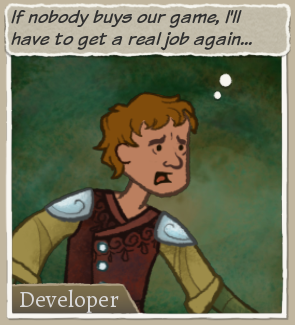
So then, we took this idea and developed it some more, and laid down some guidelines for ourselves, for how to write villains.
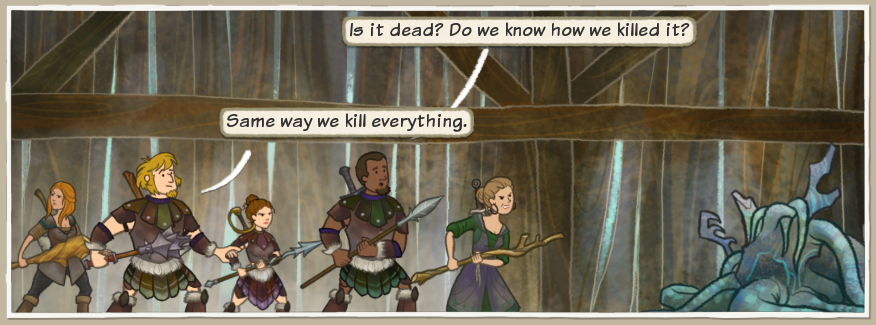
Here are the rough outlines.
Unlockable
New players will have access to one story, which will start with current tutorial material. Completing this will unlock the next batch of villains. Subsequent villains might require a number of legacy heroes at a particular tier, or have other unlock conditions. This allows those stories to, for example, start you off in a dramatically different situation, with a handful of seasoned veterans and 12 calamities on the board. It should open up some fun stories.
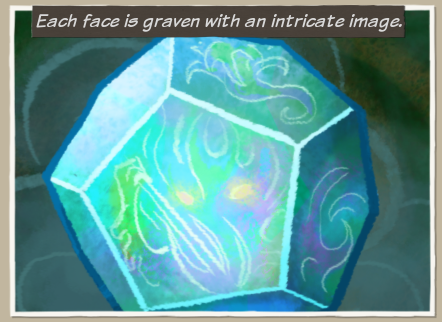
Failing Chapters
You will be able to fail (some) chapter goals without causing a game over. This allows us to have a much broader range of chapter goals, like, "rescue a hero and bring them to the final fight" or "complete this task before year 12." Chapter goals can be story-driven, and failure will have consequences, which will probably be fairly uniform (e.g. extra calamities).
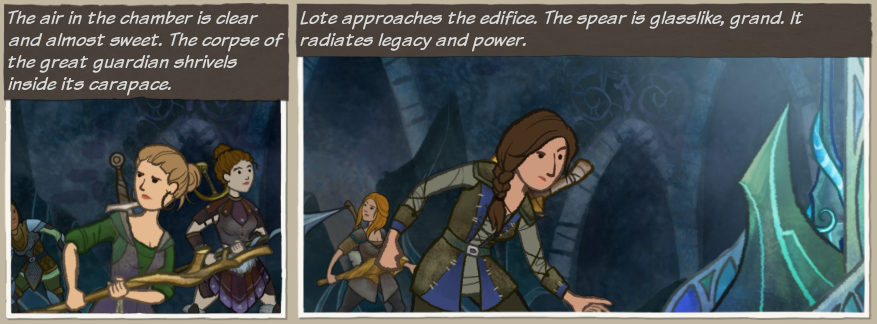
No One Hero is the Main Character
You can have a "special" hero for 1 chapter at most. This rule is important because heroes can die or retire, and if the overall plot depends on a particular hero, that won't work. So, you can have a chapter 1 goal to keep a particular hero alive, but you must allow the goal to fail, and therefore you can't require the same hero in chapter 2.
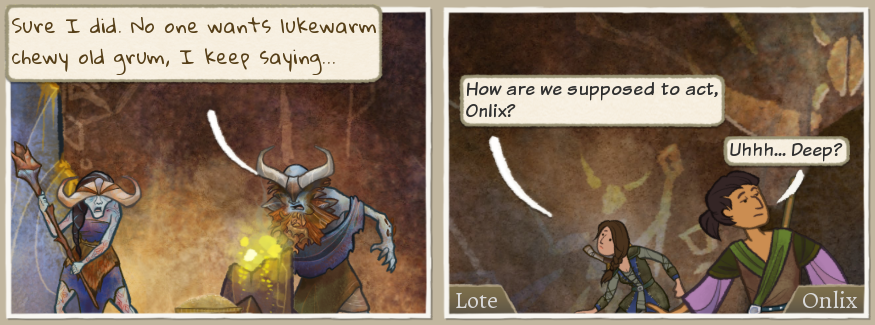
Give Structure and Meaning
Villain content won't change or replace the bulk of our existing content. Villains are there to provide meaning and structure that spans the whole campaign, but don't need to be involved in every single fight. We think the meat and potatoes we've got in the game now is working well, so we won't be breaking it. Complexity-wise, expect each villain story to have one or two big choices, which might be about whether you succeed or fail at a chapter goal.
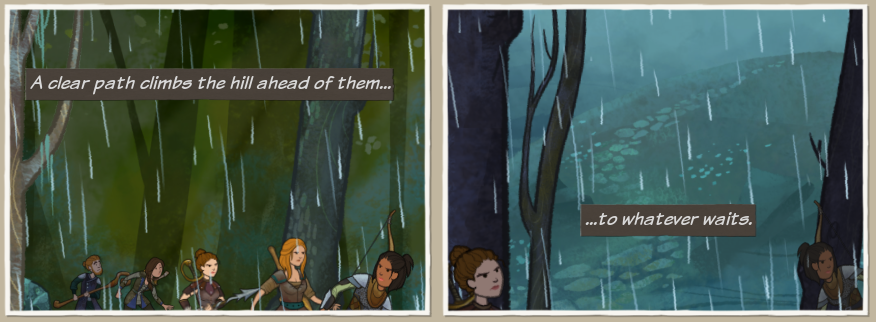
Roadmap
The first villain took about a month to write, and has not yet been integrated. We'll need to build some tech for that, but we don't expect tech to be the blocker for long. We expect subsequent villains to be pretty straightforward, tech-wise. We plan to turn the feature on when we have 3 complete villains. We may or may not disable the old-style campaigns at that time.
Risks
Are we building the right thing? Maybe this isn't what you want. Maybe it will take away from the sense of a story that you own completely, and make Wildermyth more like all the other RPGs out there? I worry about that! Maybe this will make the dynamic writing and procedural storytelling that we do less obvious, and will ultimately ruin the game? What if we have five villains, and when you play them all, you're done with the game? Maybe we'll want to preserve and/or even expand a "simulation mode" where there is no one set story?
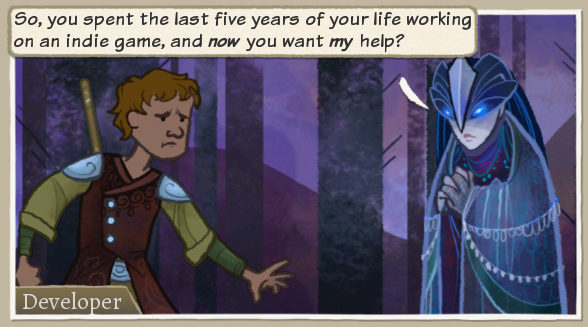
...we have no idea I guess! But we think if we can produce new villains fast enough, then the upside of having more stories will outweigh the downsides of moving away from some kind of procedural purity. Time will tell! But let us know if you have a guess one way or another!
Secret Goals
In the course of building Villains, we're going to need to build a bunch of special maps, and we'll need to build a structure that makes it easy for us to string stories together over a whole campaign, easily handle failure, etc.. Those things aren't too far away from what the game already does so I'm not too concerned, but I think it opens up some really cool possibilities.
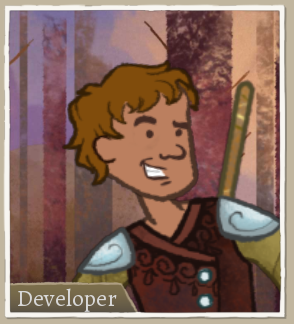
What if anyone can write their own villain? What if you can build your own battle maps, and string them together with your own comics? That's the thing that I'm the most excited about, and what I think really convinced us that this was an exciting direction. Can we make tools that will allow you to really and truly tell your own story, that anyone can play through with their own heroes? I think we're alarmingly close to being able to answer that question.
Thanks for reading, and let us know what you think! We're listening!
Get Wildermyth
Wildermyth
Defend the Yondering Lands in turn-based combat and grow a band of reluctant farmers into unique legends.
| Status | Released |
| Author | Wildermyth |
| Genre | Role Playing |
| Tags | Character Customization, Fantasy, Meaningful Choices, Procedural Generation, Singleplayer, Story Rich, Tactical RPG, Turn-based, Turn-Based Combat |
| Languages | English |
More posts
- Patch Notes: 1.16+55975 days ago
- Patch Notes: 1.16+55675 days ago
- Patch Notes: 1.16+554Jan 14, 2025
- Patch Notes: 1.16+552Oct 25, 2024
- Patch Notes: 1.16+551Oct 02, 2024
- Patch Notes: 1.16+550Sep 11, 2024
- Patch Notes: 1.16+549Sep 04, 2024
- A FarewellJun 21, 2024
- Wildermyth: Omenroad is Available NOW!!!Jun 21, 2024
- Patch Notes: 1.15+505 Orien MartenOct 11, 2023
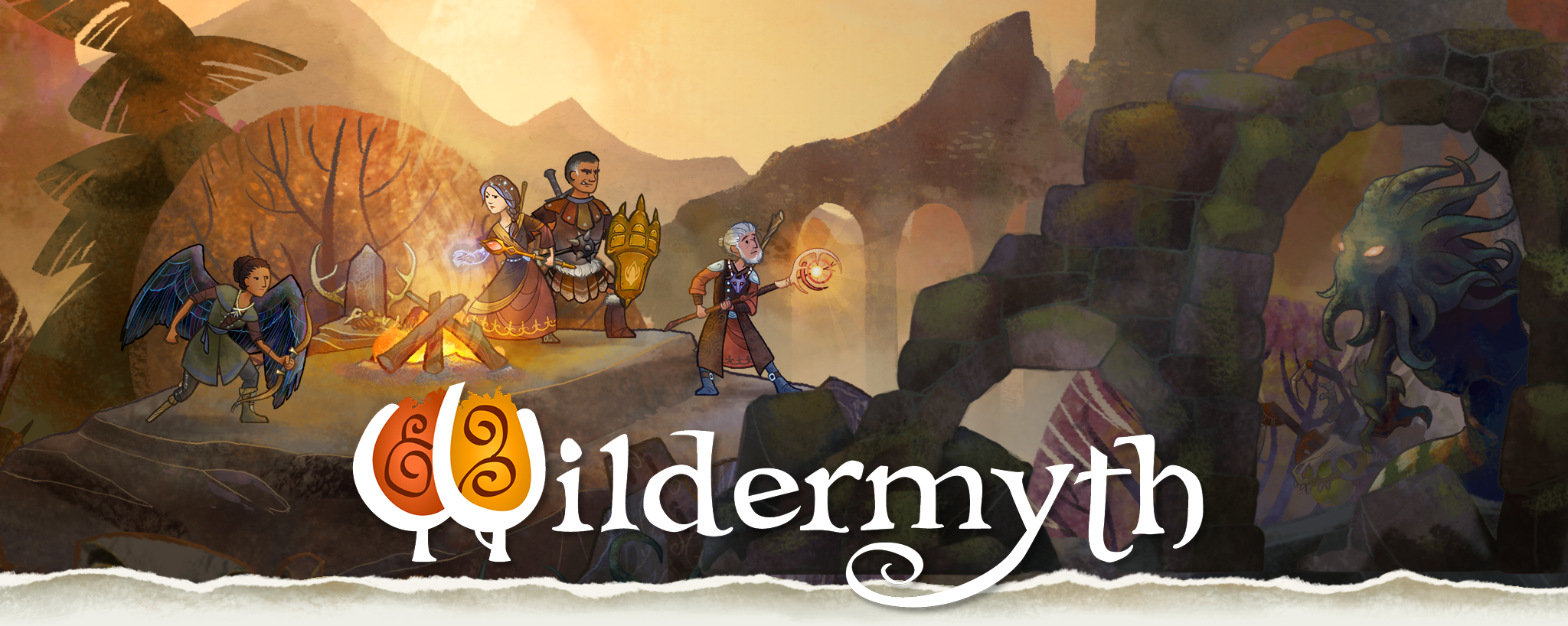
Comments
Log in with itch.io to leave a comment.
Helllo! Just purchased Wildermyth, looks super interesting. As developer of a story-driven game, it sparks inspiration! We're working on players having a unique story with each playthrough, so your title resounded with my goals. It's always super cool seeing an innovative story-driven project.
Awesome! Yeah, it's a fun space, we're pretty excited :-D
First of all, would like to congratulate you on the work you have done with the game so far! I have quite enjoyed it and am looking forwards to see how it would develop!
Thinking about the idea of villains, one of the thoughts that came to me is that in many modern stories and traditional mythologies the heroes and the villains came from the same stuff, so to speak, and many of the villains we like actually started out as decent heroes in one form or another.
Perhaps having a system where one or some of your heroes could be recast as the villains of your own story and mythos could help not only help secure a more cohesive overarching story plot, but also help create a personal relationship between both the player characters and the villains and also between the players and the villains themselves.
Conditions for generating such villains could be things like character death, or failing certain hero-character related chapter goals. Perhaps this is not the road you wish to take, as this may be too close to the concept of procedurally generated villains that encourage players to do weird things in their playthroughs to generate them, but maybe a mixture of bespoke villains and turned heores could work out as a mix?
Whichever direction you choose to go in, looking forwards to see where it takes you!
Thanks!
Yeah, the hero-turned-villain is a great story and I think we'll defintitely get around to it some point. A lot of our monster groups are definitively non-human, but not all of them, and even the monstrous ones are often open to human influence and manipulation... Fun stuff!
Unlocking such a villain with a game event is not too bad. I think the villain story would still be a crafted one, with the hero plugged in, for the reasons listed above. But yeah having "achievements" or similar mechanisms that unlock additional stories feels good. Though, incentivizing players to kill their heroes for meta reasons does not..
Hi. I played the campaigns of version 0.3+34 Bronken Stuart and enjoyed it very much. It's the potato and meat thing you mentionend I think.
I also try to discuss the "overarching"-story thing (and others) a little bit.
I play roleplaying video games since 1989 on the Amiga 500 and on PC, NDS, XBox 360, PS4 later and so on ...
Very outstanding games I played in that genre were Bard's Tale II, Dungeon Master, Might and Magic 3 (& 6 later), Pool of Radiance, Wizardry 6 - Bane of the cosmic forge, Eye of the Beholder, ...
And nowadays Diablo 2, Gothic 2, Fable 2, Mass Effect 2, Legend of Grimrock 2, Guild Wars 2, Skyrim ... did anybody notice the 2s? ;)
So of course its a IMHO and I made the list to show into what genre I see Wyldermyth in and also what I would call "real" roleplaying video games. The list is not complete in any ways of course ...
Perhaps it's interesting to think about what Wyldermyth does compared to the games I listed. What does it different and what does it not because it wants to be different ...
Should it be completely scripted or procedurally/generic or how much of both?
Think about Gothic 2 for instance. All was scripted but you had to choose one of three factions and as a consequence could play only that part of the game (simplyfied a little bit).
Fable 2 also was completely scripted. By choosing good or evil playstyle different things were playable in the game. I think the point is clear.
But there were other games like Stalker - Clear sky that did more of a simulation or tried to I think. Perhaps it worked really with the follow up (the 2 again). Ok this is the "the world does its thing and you can be part of events or not" approach. A good game I think.
Then the Mass Effect trilogy had one big vulnerable point: Did your choices change anything? And here comes part 2 into play: they did! This was the game I played through the most times of all games.
So your beloved party members were killed when you did the wrong choices and I had to play it through several times to have them all on board again ...
Dungeon Master because I never played it through. I also failed many many times. And it was completely static.
I first would say that I would go more into the direction that the game is played one or two times at most (one whole campaign for instance). Nowadays there are many many other games that all want to be played ;)
Another thing is that in my opinion you don't get replayability by using different possible events. Perhaps you get the right one for the player? what he likes? Good or evil for instance or a little bit more fine grained?
I think failing gives the most replayability. Fail hard and early perhaps. Or two times with most hardness the latter.
Yes. I have the same feeling. There are many nice things in the game. But all are not epic and outstanding. In my opinion the reason for that is that it is procedurally and generic. It feels like it. I think it is not even good to pronounce this for the game. But I have the feeling that this could be used to model real consequences in the game and real choices. This is the strongest thing in the game I think that a character can die because of a decision for instance. But then the character has to be less generic before to really let the player feel the pain about it if the character dies. This all works with the concept of creating a fixed party in the beginning and loving it. Then I would do much to keep them alive. Perhaps these first characters can have a special meaning to the game. The attributes of the chosen characters could drive the game into a certain direction?
I often read the game attribute epic on steam. But what does it mean? A meaningful story that gets more dense and dense? A finale? I think so.
As I read villain I thought about opponent instantly. The big opponent. Okay this is always the same problem. In the real world there is no opponent. And this is what wyldermyth tries to imitate? My feeling says that epic always means big opponent (and has nothing to do with the real world. it is fantastic). Perhaps I am a bit narrow minded but all epic games have this big opponent ... So if there is a something that gives the story to do something with then there is a why and this why comes from something. And I think this something should be concrete and imaginable.
The funny thing is that having different big opponents would make different games.
Perhaps this is the problem of the "game" right now? It is more of a game generator with much good existing content of course and you don't want to fixate one real good set of weights that make an epic game? Let's train a KI to get the best weights out of it ;) - joking. sorry.
You could make both the game generator and an epic game?
Perhaps some Riddles ...
Ugh. It got much text. Wrote it outside in the editor. Hopefully It is understandable and helps something ...
Yeah, lots of good stuff here, thanks for writing it up. I played the old Might and Magics (2-5, World of Xeen was my favorite) and Wizardy 8, and there's a lot of meat there, and then I also think there are a lot of other games mixed into the DNA of Wildermyth besides those... FTL, Dwarf Fortress, D&D, and XCOM of course.
What we're trying to do, at the highest level, is to make a tool that lets players create their own mythologies, by which I mean, a pantheon of iconic heroes that you totally own because you made them that way. In order to accomplish that, we use procedural generation to make the heroes unique, and then we throw a bunch of different stories at you and see how it shakes out. It's a bit like FTL in that sense, but with the focus on the cast of heroes, not the ship.
If we have a single story, that's not going to be fertile grounds for a mythology. So, at first we were trying to just handwave that, and say, eh, let's all fight, because monsters. But we think there's a lot of space for a cast of villains that give the heroes something to really fight against. We want to be able to eventually produce enough villains that the game becomes about experiencing all those different stories, and as you go, your cast of legendary heroes grows organically. That's the thought at least!
You're definitely right that the word epic is overused, and we're certainly guilty of that. If it means anything in the context of Wildermyth, I think it means that the story takes place over 40-100 years, and many heroes will come and go in the telling of it. Also it's trying to say that some heroes will reach somewhat absurd heights, visually, and in the gameplay. A hero with demon arms and crow wings, that sort of thing. I don't have a word for that kind of hero.
Thanks for your thoughts!
Ah, yes. XCOM! How could I forget that? I played the very first game on the Amiga of course ;)
Technically this genre has much replay value, because the development of yourself can be different and the response of the aliens can be different then, too.
And yes, Wyldermyth has many similarities to that genre. Now that you say it ...
But to the replay value again. I said technically because at some point the game is simply done, because every mission is the same: Fight the monsters.
So to keep the player busy with value I think the goals of the fights have to vary as much as possible. So a type of stories could lead to fights with a certain goal for instance. That missions (the fights) can be different I have seen in Druidstone - new game of the legend of grimrock makers: Lead a character out of the fight for instance and leave the monsters there ... way not?
Or solve a riddle while monsters are attacking and run away afterwards ... perhaps you already do that. I didn't play the last version yet.
XCOM of course has the big opponent too. First of all the big threat of the aliens. But in the end the big boss to be fought on the home planet of the aliens. I'll ride on that a little bit for a while ;)
The good the genre is and I loved it much so it can have a big problem of motivation too: If the own development does not run well enough the game gets frustrating more and more. And this frustration grows very slowly step by step. You can compare it to a slowly growing depression. So the problem is not the failure of the player but that it is realized slowly and very late in the game. This has to be avoided at any cost I think!
Wyldermyth can have that problem too if the management of the heroes does not run that good.
So no general book this time. Stuck at a game for a little seems better ;)
Yep, more combat variety is needed. That's a big part of the reason we're in beta, there are a bunch of things we still have to do . Variety in monster abilities, in maps, in mission goals, all that stuff sounds fun!
Very nice. I'd love to play that very much :)
What I forgot to write about are dungeons. I don't see it directly in the current game because of the overworld mapish design.
How would you integrate that? As part of a campaign on a different map or so?
Dungeons - we'll see. We have some underground battle maps now, but as for more extensive dungeons, it's not on the immediate list. But I think it would be fun to think about it later on. Maybe multi-part missions, that sort of thing.
i gotta admit its a lot of very hard to do answers. my thoughts would be that a game like this would use a system similar to that of those open-world LOTR game where you have a whole hierarchy of asshats that fight over each other and occasionally you or civilization. That or maybe something from another roguelike: Dungeonmans. In that game if you die in a dungeon, the guy who killed you gets a fancy name and title and becomes the new guy running the dungeon. If you died in the overworld or something then a new looter camp or dungeon would pop up with your killer chillin there along with the bones of your previous dungeonman.
Yeah that system is pretty cool, but the way our game is right now, hero deaths are not really guaranteed to happen, and might be just too rare to count on, depending on the difficulty level. We also don't have a persistent world in the same way, the lands are generated fresh each time. But so yeah those are great ideas, but there's also some distance between "here is a bandit" and "here is an epic 100-year storyline", and that's the thing we're really trying to solve here. Legacy monsters sound awesome though and I'd love to revisit them.